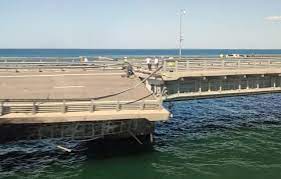KYIV (Agencies): In a sudden development, Russia announced on Monday it would no longer be participating in a significant UN-brokered agreement that allowed Ukrainian grain to be exported to the world through the Black Sea — a move that is bound to worsen the commodities crisis.
The deal, brokered by the United Nations and Turkey last July, aimed to alleviate a global food crisis by allowing Ukrainian grain blocked by the Russia-Ukraine conflict to be exported safely. The last ship left Ukraine under the deal on Sunday. Russia’s February 2022 invasion and blockade of Ukraine’s Black Sea ports sent global grain prices soaring. Ukraine and Russia are among the world’s top grain exporters.
Nearly 33 million metric tons of corn, wheat and other grains have been exported by Ukraine under the arrangement. Russia has officially notified Turkey, Ukraine and the United Nations that it is against extending the Black Sea grain export deal, the RIA news agency reported on Monday, citing Foreign Ministry Spokeswoman Maria Zakharova. This decision came just hours after Moscow accused Ukraine of attacking the Crimean bridge.
The attack on the 19-kilometre road and rail bridge, which connects Russia to Crimea, was portrayed by Russia as a terrorist act targeting a crucial route for Russian troops involved in the conflict in Ukraine. The bridge, a project personally inaugurated by President Vladimir Putin, holds significant prestige for Russia.
Tragically, two individuals lost their lives in the blasts, while their daughter sustained injuries. Despite the timing, the Kremlin emphasized that the suspension of the grain agreement was unrelated to the bridge attack. According to Kremlin spokesperson Dmitry Peskov, Russia’s decision was based on the fact that certain aspects of the Black Sea grain deal, which aimed to address the global food crisis exacerbated by Russia’s invasion of Ukraine, were not fulfilled.
Consequently, Russia declared the agreement null and void, with the intention of rejoining once the conditions pertaining to Russia were met. The agreement, originally set to expire on Monday, now faces an uncertain future. While the Ukrainian military suggested that the attack could potentially be a provocation orchestrated by Russia itself, local media sources, citing unidentified sources, point towards Ukraine’s Security Service as the responsible party behind the incident. Further investigation is underway to determine the true culprits behind this tragic event.
Meanwhile, UN Secretary General Antonio Guterres said on Monday that millions of people facing hunger will “pay the price” of Russia’s decision to exit the Ukraine grain deal. He told reporters at the United Nations headquarters in New York that the move by Moscow will “strike a blow to people in need everywhere”. “Hundreds of millions of people face hunger and consumers are confronting a global cost-of-living crisis. They will pay the price,” Guterres said.
The UN chief’s statement comes after the Kremlin said it was exiting a major agreement to facilitate Ukraine grain exports hours after drones struck Russia’s only bridge connecting its mainland to the annexed Crimea peninsula. Moscow, which has for months complained about the implementation of the grain pact, said the attack on the Kerch bridge had nothing to do with its withdrawal from the deal designed to avoid food shortages in vulnerable countries. The UN chief said today that he deeply regretted Russia’s decision but added it would not stop the world body’s efforts to “facilitate the unimpeded access” to global markets of food and fertilisers from Ukraine and Russia.
“Looking ahead, our goal must continue to be advancing global food security and global food price stability. “This will remain the focus of my efforts, taking into account the rise in human suffering that will inevitably result from today’s decision,” he said. Guterres lamented that a letter he had sent to Russian President Vladimir Putin last week with a new proposal to keep the initiative alive “went unheeded.”
The letter, the contents of which had not been made public until now, proposed that a subsidiary of Russia’s main agricultural bank, whose activities are hampered by sanctions, be reconnected to the global SWIFT banking system. Russia has long complained that sanctions had hampered its own exports of grain and fertiliser, meaning that its terms for extending the initiative were not being met.
Guterres noted progress in this area, writing to Putin that “Russian grain trade has reached high export volumes and fertiliser markets are stabilising with Russian exports nearing full recovery.” Earlier at the UN, US Ambassador Linda Thomas-Greenfield accused Moscow of holding “humanity hostage” by exiting the grain deal. She said Russia had “dealt another blow to the world’s most vulnerable,” just a week after it blocked renewal of a key aid route to Syria that is a lifeline for millions of people living in rebel-held areas of the country. “This is really another act of cruelty,” Thomas-Greenfield said of the grain deal withdrawal. “While Russia plays political games, real people will suffer,” she added.







